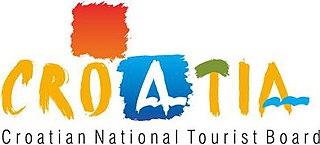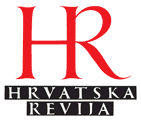
The Croatian Democratic Union of Bosnia and Herzegovina is a Christian democratic Croatian nationalist political party in Bosnia and Herzegovina, representing the Croats of Bosnia and Herzegovina. It is an observer member of the European People's Party. Its headquarters is in Mostar.
In Croatian, hrvatski is the masculine adjectival form meaning "Croatian", both in the plural and singular; it is hrvatska in the feminine singular, hrvatske in the feminine plural, hrvatsko in the neutral singular, hrvatska in the neutral plural. The word hrvatski is also used to refer to the Croatian language, whereas Hrvatska is the native name for Croatia, the country. As such, all four forms commonly appear in native names of many Croatian government institutions, companies, political parties, organisations and sports clubs, as well as some place names.
This article gives an overview of liberalism in Croatia. Liberals became active since 1860 in Dalmatia and since 1904 in the rest of Croatia. It never became a major political party. It is limited to liberal parties with substantial support, mainly proved by having had a representation in parliament. The sign ⇒ denotes another party in that scheme. For inclusion in this scheme it isn't necessary so that parties labeled themselves as a liberal party.
Liberalism in Serbia is limited to liberal parties with substantial support, mainly proved by having had a representation in parliament. The sign ⇒ denotes another party in that scheme. For inclusion in this scheme it is not necessary so that parties labeled themselves as a liberal party.

The Democratic Alliance of Croats in Vojvodina is a political party in Serbia, representing the Croat ethnic minority in the province of Vojvodina.

Matica hrvatska is the oldest independent, non-profit and non-governmental Croatian national institution. It was founded on February 2, 1842 by the Croatian Count Janko Drašković and other prominent members of the Illyrian movement during the Croatian National Revival (1835–1874). Its main goals are to promote Croatian national and cultural identity in the fields of art, science, spiritual creativity, economy and public life as well as to care for social development of Croatia.

The Croatian National Tourist Board is Croatia's national tourist organization founded with a view to promoting and creating the identity, and to enhance the reputation of, Croatian tourism. The mission also includes the planning and implementation of a common strategy and the conception of its promotion, proposal and the performance of promotional activities of mutual interest for all subjects in tourism in the country and abroad, as well as raising the overall quality of the whole range of tourist services on offer in the Republic of Croatia. Its headquarters is located in Zagreb.
The Croatian Democratic Union 1990 is a political party of Croats in Bosnia and Herzegovina. It split from the Croatian Democratic Union of Bosnia and Herzegovina and is led by Ilija Cvitanović. In 2006, it was the leading member of the Croats Together coalition.

Croatia–Ukraine relations are foreign relations between Croatia and Ukraine. The countries established diplomatic relations on 18 February 1992. Croatia has an embassy in Kyiv and an honorary consulate in Donetsk. Ukraine has an embassy in Zagreb and honorary consulates in Malinska and Split. Croatia supports Ukraine's European Union and NATO membership.

Hrvatska revija is a Croatian quarterly published by Matica hrvatska (MH) based in Zagreb.

Ivan Lorković was a Croatian politician from Zagreb who was a prominent member of the Croat-Serb coalition, a supporter of the Republican organization, and a member of the United Croatian and Serbian academic youth organization. He was the leader of the Croatian Federalist Peasant Party from 1926 to 1929.

The Old City Hall is a complex of three adjacent buildings located in the Gradec neighbourhood in Zagreb, Croatia. The three buildings were joined in the late 19th century and since then, the complex has served as the place where all sessions of the city assembly are held.
Croat People's Union was a Bosnian Croat political party in Bosnia and Herzegovina. Party was founded by Ivo Pilar in 1910 with goal to represent interests of Croats in the Condominium of Bosnia and Herzegovina. With creation of Kingdom of Yugoslavia, HNZ become inactive and was refounded in 1992 by Milenko Brkić and in 2010 it was incorporated into the Croatian Party of Rights of Bosnia and Herzegovina.
The Croatian Republican Peasant Party was a political party formed from a faction split from the Croatian Peasant Party in 1941. The HSS was once the most popular political party among the Croats in the Kingdom of Yugoslavia, but after the Axis invasion of Yugoslavia, the HSS splintered in several groups including the faction that would become the HRSS. It joined the Yugoslav resistance led and dominated by the Communist Party of Yugoslavia (KPJ) and by its branch in Croatia – the Communist Party of Croatia (KPH). The prewar leader of the HSS Vladko Maček opted to wait for the war to end, while another faction joined the Ustaše movement that ruled the Axis puppet Independent State of Croatia (NDH).

Frane Frol was a lawyer and Croatian and Yugoslavian politician. He was a member of the Croatian Peasant Party and the group that split from the party known as the Croatian Republican Peasant Party. In 1943, Frol joined a faction of the HSS cooperating with the Yugoslav Partisans against the Axis powers following the World War II invasion of Yugoslavia. He was a delegated to the State Anti-fascist Council for the National Liberation of Croatia as well as the Anti-Fascist Council for the National Liberation of Yugoslavia. He was appointed to the presidencies of both ZAVNOH and AVNOJ. In 1944, he was appointed the judiciary commissioner in the National Committee for the Liberation of Yugoslavia and then the justice minister in the Provisional Government of the Democratic Federal Yugoslavia and several governments of the Federal People's Republic of Yugoslavia.

The Ustaše Youth was the youth wing of the Ustaše, a Croatian fascist organization active during the interwar period and World War II. The Ustaše governed an Axis puppet state called the Independent State of Croatia between 1941 and 1945.

The Croatian Republican Party is a Croat conservative, centre-right political party in Bosnia and Herzegovina. The party also participates in 11th electoral district for Croatian parliament in cooperation with The Bridge.
The Croatian Union was a Croatian political party in Kingdom of Serbs, Croats and Slovenes. The party was founded through the merger of the Mile Starčević faction of the Party of Rights and the Progressive Democratic Party. Thus formed party, led by Ivan Lorković and Matko Laginja, had its representatives in the country's provisional legislative body, the Temporary National Representation.










